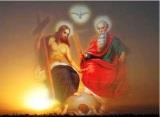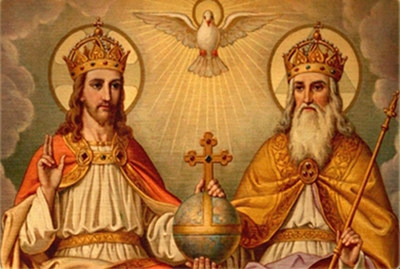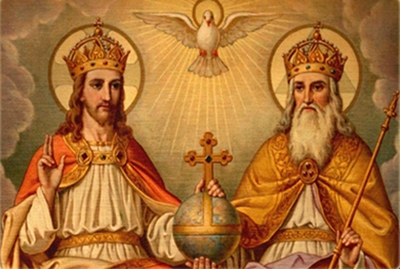THE LOVE OF THE TRINITY
According to St. Francis of Assisi and St. Augustine
 According to the doctrine of the Church there are three main mysteries: the mystery of the Trinity, the mystery of Jesus coming down from heaven and the mystery of Jesus our Saviour. What does the word mystery mean? It means something strange or unknown which has not yet been explained or understood. Indeed, the Mystery of the Trinity is the most difficult doctrine to understand and it is also rather hard to explain. However, it is the most important doctrine for our faith and also for our Christians lives as the Church solemnly celebrates it today.
According to the doctrine of the Church there are three main mysteries: the mystery of the Trinity, the mystery of Jesus coming down from heaven and the mystery of Jesus our Saviour. What does the word mystery mean? It means something strange or unknown which has not yet been explained or understood. Indeed, the Mystery of the Trinity is the most difficult doctrine to understand and it is also rather hard to explain. However, it is the most important doctrine for our faith and also for our Christians lives as the Church solemnly celebrates it today.
St. Augustine is both a great saint and a well-known mystic who had experienced much about the Trinity. He explains that these three: memory, understanding and will are not three lives but one life, nor three minds but one mind. So it follows, of course that they are not three substances but one substance. In fact, although they are not only each contained by each, they are all contained by each other as well. After all: (a) I remember that I have memory, understanding and will and, (b) I understand that I have the capability of understanding, having free will and remembering, and (c) I will that I will, remember and understand, and (d) Finally collectively I remember my whole memory and understanding and will all together (The Trinity X.4.18). Here we are then with the mind remembering itself, understanding itself, loving itself; if we see this, we see the Trinity, not yet God, of course, but already the image of God (The Trinity XIV.4.15).
Unlike St. Augustine, St. Francis did not explain the Mystery of the Trinity as three persons in one substance but he explains to us about their work and their love through the creatures. God is the Father who loves the world so much that He created the universe and made everything so beautifully.The Father is also the most powerful being as Francis wrote: ‘Most High, all powerful, good Lord, to You alone, most High.’ (The Canticle v 1a). Francis also said: ‘God is good, totally good and all good; God is merciful, gentle, delectable, sweet and lovable.’ (Matura: 47)
With the Son, St. Francis said Jesus also loves the world and he shows his love to people. Francis was aware that there could be no direct way for humans to get to God therefore, there had to be an intermediary. Thus, we can only reach God through Jesus Christ because He is central to everything. He is the way, the truth and the life that leads us to the Father. (John 14:6) This implies the divine lordship of Christ, He is Lord and also ‘Lord of the universe’ (Van Khanh: 41) therefore He should receive the homage of all creatures who are united in one family: ‘Yours are the praises, the glory, the honour and all blessing.’ (Canticle v. 1b)
With the Spirit, St. Francis explained that the Spirit unites with the Father and the Son and this helps us to understand the divinity of Christ as St. Paul said: ‘No one can say “Jesus is Lord” except in the Holy Spirit’ (1 Corinthians 12:3). Francis also called the Spirit of holy prayer and devotion to which all other things of our earthly existence should contribute (Red B 5:2). It is also He who is ‘Spirit and life’ (John 6:64) who gives vitality and efficacy to the word of God and without whom that word would be empty (2Corinthians 3:6). Moreover, the Holy Spirit gives us ‘the eyes of faith’ to ‘contemplate’ Christ in the Eucharist – The Sacrament of love that God truly loves us and remains in our hearts (Adm 1:20).
As the Church celebrates the feast of the Holy Trinity today, may God help us to be like St. Francis of Assisi and St. Augustine so that we too can believe, trust and live with the love of God. The Mystery of the Trinity is the mystery of love. Indeed, we know that the Father, the Son and the Holy Spirit love each other, take care of each other and also offer sacrifices for each other. May God help us to imitate the Trinity, so that within our family and community we can learn to love, look after and make sacrifices for one another with hope that one day we will all be at peace and experience joy and total happiness in our lives.
Fr. Peter Thanh Ha










